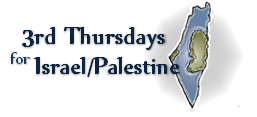Third Thursday alert: Support a shared Jerusalem
Organizations in the Faith Forum on Middle East Policy send out action alerts monthly, focusing on different issues so that members of Congress hear consistently that their constituents support a just and lasting resolution to the Palestinian and Israeli conflict.
Call on Congress to support a shared Jerusalem, where the rights of all are respected
“As he came near and saw the city, he wept over it, saying, ‘If you, even you, had only recognized on this day the things that make for peace!” (Luke 19:41a)
Holy Week brings pilgrims from all over the world to Jerusalem, yet Christians who live just next door to the city must get permits to worship there and may be denied entry altogether. Palestinian Christians are raising awareness about this and other issues through their April 7 Kairos Palestine Easter alert, which focuses on the deep impact of the Israeli occupation on every aspect of life in Jerusalem.
Besides being a place of pilgrimage, Jerusalem is home to over 800,000 residents, 62 percent of whom are Jewish, 35 percent Muslim, and about two percent Christian. Israel claims all of Jerusalem as its capital, having unilaterally annexed the eastern portions of the city following the 1967 war in a move not recognized by the international community, including the United States. However, even as the final status of Jerusalem remains officially undetermined – awaiting a negotiated peace agreement – the facts on the ground continue to change in such a way that Palestinians are increasingly deprived of basic human rights.
Housing is one of the key areas in which Palestinians face discrimination. It is nearly impossible for Palestinians to get building permits from the Israeli authorities, and when they build without a permit, their homes and other structures face the very real threat of demolition. The Israeli human rights organization, B’Tselem, compiled data from 2004 to 2014 showing that during this period, 503 housing units were destroyed in East Jerusalem, leaving 1,967 people homeless, including 1,072 minors. The Easter alert includes a statement from the Latin Patriarch of Jerusalem, Patriarch Fouad Twal, made when he visited the ruins of a demolished home belonging to the church: “Looking upon a painful and upsetting scene raises discontent and anger. There is no justification for the demolition…”
Even as Palestinian homes are destroyed and their residents displaced, building continues in the illegal Jewish settlements in East Jerusalem. Israel announced plans for 700 new housing units in the East Jerusalem settlement of Gilo on April 1.
Palestinians are also subject to having their residency rights in East Jerusalem revoked, due to discriminatory laws and practices of the Israeli government. “The status of permanent residency can be easily revoked if the resident leaves the country for more than seven years or if he gets permanent residency or citizenship anywhere else in the world,” notes an article in the Easter alert. B’Tselem reports, “Since 1967, more than 14,000 Palestinians in East Jerusalem have had their status as permanent residents of Israel revoked by the state.”
Palestinians’ right to education in Jerusalem is compromised in several ways by the Israeli occupation. The Easter alert references among other problems in the education sector, the separation barrier that delays or prevents students from getting to school and a permit system that can result in West Bank teachers not being able to reach Jerusalem schools.
The restrictions on movement which affect education also affect Palestinians’ access to worship sites. For Palestinians living in the occupied territories, getting to and from Jerusalem means navigating an obstacle course of checkpoints, permits, intermittent closures, and the separation barrier. Even for Palestinian residents of Jerusalem, celebrating religious holidays can be a challenge. Yusef Daher recounts in the Easter alert his own family’s difficulty in making their way along the Via Dolorosa on Good Friday of last year. His 16-year-old daughter managed to slip into the Church of the Holy Sepulchre, but her friend was caught and beaten by police.
As Christians, we have an Easter hope that calls us to live a resurrection life in the here and now. What does that mean in practical terms as we look at the injustices of daily life in Jerusalem? Palestinian Christian Hind Khoury, reflecting in the Easter alert, writes, “As we celebrate this coming Easter we wonder: Isn’t God’s Covenant availed to all his children? Shouldn’t our labor be focused on building the real peace in Jerusalem, the symbol of eternal peace?”
Take a step for peace today: Contact your elected officials and ask them to support a shared Jerusalem where the rights of all are respected. Ask them to insist on a halt to home and property demolitions, an end to settlement expansion, fair residency laws, and freedom of movement for education, worship and all aspects of daily life.
In a piece in the Easter alert entitled, “Living Hopefully in a Hopeless Situation,” Bishop Dr. Munib Younan, president of the Lutheran World Federation and Bishop of the Evangelical Lutheran Church in Jordan and the Holy Land, offers these words of sumud (steadfastness), “We will not allow extremism, oppression, violence, bloodshed, hatred, walls, demolitions, settlements, or confiscated lands to diminish our hope, to make us give in to despair. The hope of living with dignity, justice, and reconciliation will triumph over the dark forces we face. This is the power of the cross today…”
In resurrection hope, let us pray and work for justice and dignity for everyone in the land of the Holy One.
Use this link to send a message to your members of Congress, urging their support for a shared Jerusalem.

